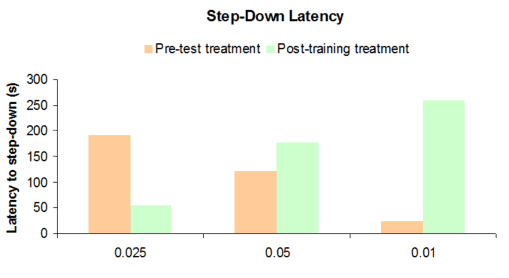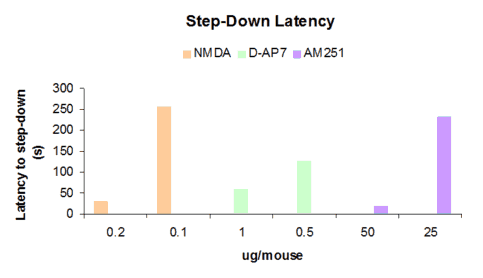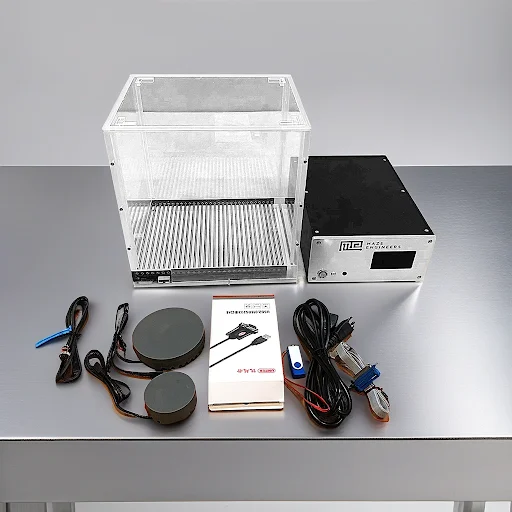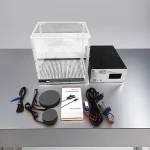| Mouse & Rat Step Down Avoidance |
| Vibrator |
| Shocker |
| 1 Enclosure |
| 2 Platforms: 7cm; 11cm platform |
Dimensions
Mouse Contextual Cage
- Length: 28cm
- Width:: 23cm
- Height: 26cm
- Acrylic Plate Designs:
- Striped, Chessboard, Grey , White, Black
Rat Contextual Cage
- Length: 42cm
- Width:: 35cm
- Height: 39cm
- Acrylic Plate Designs:
- Striped, Chessboard, Grey , White, Black

Take advantage of Neuralynx, Ethovision Integration, SMS and Email integration with the Conductor Science Software. No I/O Boxes Required
Learn More

Introduction
In the 1950s, Hudson B. B. pioneered a one-trial Inhibitory Avoidance Task (IAT) designed to assess memory retention and avoidance behavior in household mice. During the experiment, the mice received electric shocks when they approached baited visual cues, and their responses to the familiar environment were closely monitored. These observations highlighted the significant role of initial experiences in fear learning and avoidance. Since then, the task has undergone numerous adaptations, one of which is the Step-Down Avoidance task.
Similar to its predecessors, the Step-Down Avoidance task focuses on the subject’s aversive memory. When faced with an unpleasant stimulus, the subject encodes this experience as part of its fear learning process. Upon retesting under the same conditions—regardless of whether the aversive stimulus is present—the subject’s memory retention is evaluated. A longer latency before stepping down indicates better memory retention, making this task an effective measure of learning and memory performance.
The Step-Down Avoidance apparatus features a straightforward design, consisting of a transparent acrylic chamber with an electrified grid floor and an elevated vibrating platform in the center. When the subject steps off the platform, it receives a shock from the grid. The task utilizes both step-down latency and retention latency as key indicators of aversive learning and memory.
Apparatus and Equipment
The test chamber typically measures 28 x 23 x 26 cm and features a removable grid floor along with a central platform. The grid is constructed from stainless steel bars, each approximately 0.3 cm in diameter and spaced about 0.8 to 1 cm apart. An isolated stimulator delivers direct current electric shocks (1 Hz, 0.5 s, 45 to 60V DC) to the grid floor.
The central platform can be designed as either a square measuring 4 x 4 x 4 cm or as a circular platform with an 8 cm diameter and a thickness of 4 cm.
Additionally, the apparatus may incorporate patterned contextual plates to enhance contextual learning experiments. The central platform can also be connected to an actuator, allowing it to vibrate.
Training Protocol
To ensure accurate test results, the apparatus must be meticulously cleaned before and after each trial. Video tracking software, such as Noldus Ethovision XT or ANY-Maze, can be utilized to monitor the subject’s movements within the chamber. The Step-Down Avoidance task is conducted in two main phases:
Training Phase: The subject is carefully placed on the central platform within the chamber. When it steps down onto the grid with all four paws, it receives a continuous electric shock until it returns to the platform to escape the unpleasant stimulus. Both step-down latency and escape latency are recorded. Typically, for substance tests, the subject is administered the substance immediately after this training.
Retention Test: This phase is usually conducted 24 hours after the training. The subjects are again positioned on the central platform, and their step-down latency is recorded. They are observed until a predetermined cutoff time. Regardless of their activity, subjects are then placed in a corner of the chamber with their tails facing the platform. An electric shock is administered, and the escape latency is also documented.
The Step-Down Avoidance Task serves as an effective method for assessing aversive memory and learning. Since memory itself is intangible, it is inferred through behavioral responses following specific experiences. Various substances can influence how a subject perceives an experience and affect its retention capabilities. Additionally, neurodegenerative and other neurological disorders can significantly impact learning and memory.
Evaluation of Voltage-Dependent Changes in Retention of Passive Avoidance and Escape Learning Responses: During the training session, subjects receive electric shocks of varying intensities (0, 30, 45, and 60 V). After a 24-hour period, their responses to passive avoidance and escape learning are assessed during the retention task (Kameyama et al., 1986).
Sample Data
Data collection with the Step Down Avoidance task is straightforward. Two parameters are measured during the task: Step-down latency and Escape latency. The experience in the training session affects the step-down latency and the escape latency in the retention test. These two parameters serve as an excellent measure of aversive learning and memory.

The above graph shows the effect of the pre-training microinjection of various compounds on memory acquisition and exploratory behaviors at different dosages of the therapeutics (Naeshi et al., 2015).

The graph shows the effects of post-training and pre-test administration of “m” on step-down latencies in mice at varying dosages. (Jafari-Sarbet et al., 2014)
Strengths & Limitations
The Step-Down Avoidance apparatus is easy to operate. Its electrified metal floor allows for adjustments in both voltage and shock duration delivered to the subject. While the task can function without additional stimuli or cues, acrylic contextual plates with various patterns can be incorporated to enhance contextual learning. This task can also complement other behavioral tests, enabling a broader investigation into different aspects of memory and learning. Measurements of step-down latency and escape latency serve as reliable indicators of fear learning and memory. Furthermore, the apparatus can help evaluate the effects of substances on aversive learning and memory in subjects, as well as facilitate studies related to neurodegenerative and other neurological disorders.
As with any behavioral assessments, the mental state of the subject significantly influences the accuracy of the results. Excessive training or handling may lead to unreliable outcomes. Additionally, inappropriate voltage levels or shock durations can adversely affect the subject's performance or even cause harm.
Summary & Key Points
- The Step-Down Avoidance task is a simple task used for measuring aversive memory and learning
- The apparatus is composed of a clear chamber with electrified grid flooring and a central platform
- When the subject steps down the central platform onto the grid floor with all four of its paws, a continuous electric shock is given
- The Step-Down latency and Escape latency are good parameters for measuring fear learning and memory
- Effects of substances, neurodegenerative diseases, and other neurological disorders on aversive learning and memory can be easily investigated using this apparatus
- The apparatus is easy to use, and the tasks are straightforward

 Take advantage of Neuralynx, Ethovision Integration, SMS and Email integration with the Conductor Science Software. No I/O Boxes Required
Learn More
Take advantage of Neuralynx, Ethovision Integration, SMS and Email integration with the Conductor Science Software. No I/O Boxes Required
Learn More

 The above graph shows the effect of the pre-training microinjection of various compounds on memory acquisition and exploratory behaviors at different dosages of the therapeutics (Naeshi et al., 2015).
The above graph shows the effect of the pre-training microinjection of various compounds on memory acquisition and exploratory behaviors at different dosages of the therapeutics (Naeshi et al., 2015).
 The graph shows the effects of post-training and pre-test administration of “m” on step-down latencies in mice at varying dosages. (Jafari-Sarbet et al., 2014)
The graph shows the effects of post-training and pre-test administration of “m” on step-down latencies in mice at varying dosages. (Jafari-Sarbet et al., 2014)
